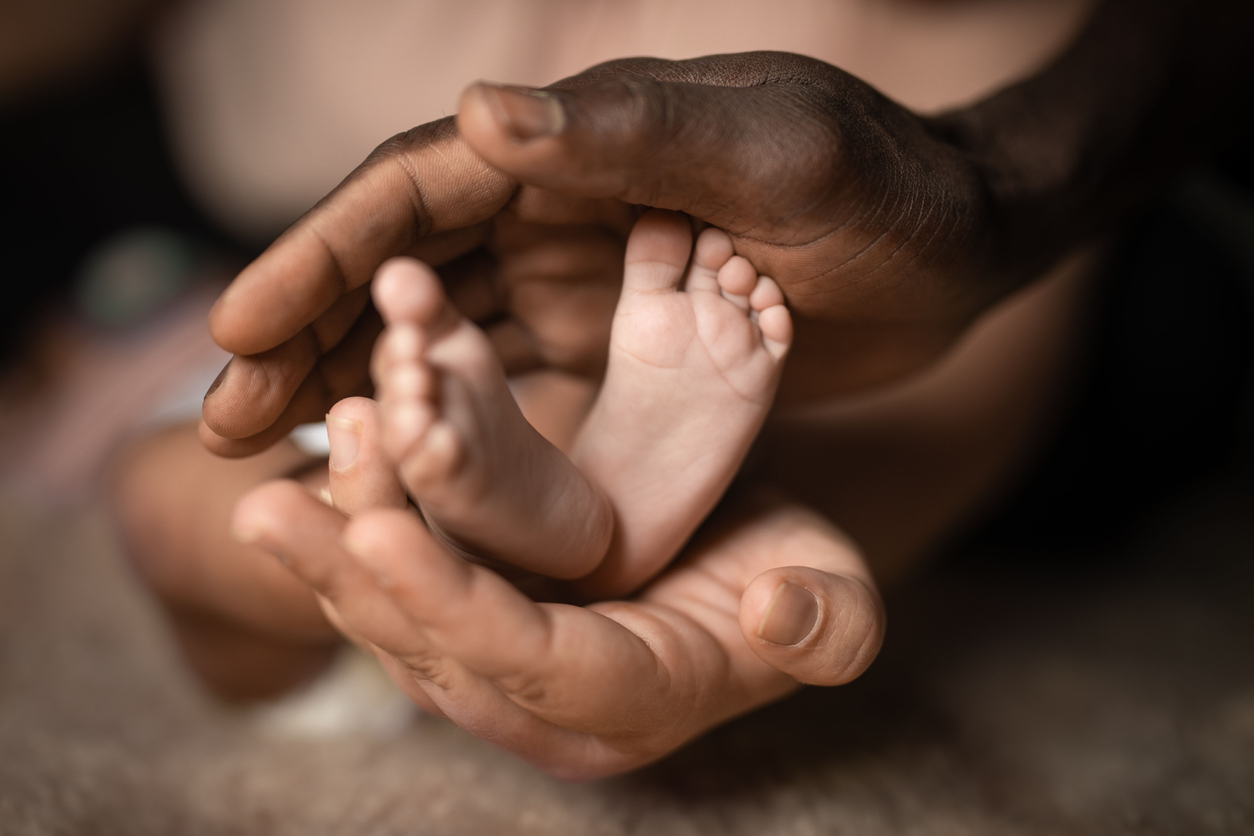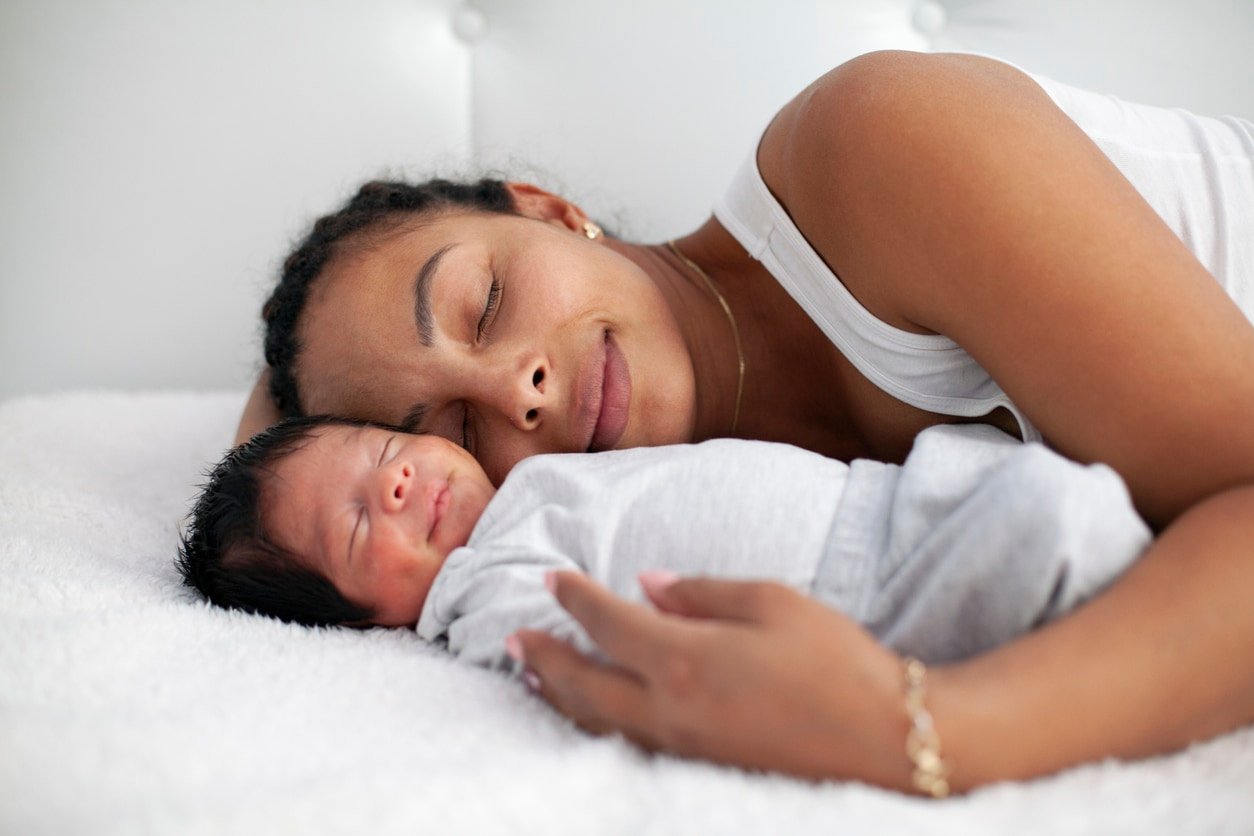
![]()

Congratulations! You are new parents and have made it through the first few weeks at home with your new baby. Those first few weeks are all about adjusting to the new normal of parenthood. As your baby becomes a 1-month-old, you are getting the hang of this whole parenting thing. You are learning more about your new baby every day and may wonder what the next stage in their growth will look like.
From the milestones they will achieve to how much a 1-month-old should eat to what their sleeping schedule looks like, you may find yourself full of questions. Well, we will help guide you through all these new changes!
Quick Contents
What Developmental Milestones Should My 1-Month-Old Baby Meet?
Watching your baby grow and develop during their first months is exciting. They are constantly growing and learning more about their environments. At 1 month old, your baby will start to achieve various milestones that involve their movements, sight, hearing, smell, and touch.
Your baby may start to experience the following developmental milestones:1
- Bringing their hands to their face and mouth
- Moving their head from side to side during supervised tummy time
- Focusing on an item that is up to 12 inches away
- They can focus on black-and-white or high-contrast patterns more easily than busy patterns
- They recognize sounds and may turn toward a familiar voice
What Should My 1-Month-Old Baby’s Feeding Schedule Look Like?
By 1 month old, your baby will start to gain a more predictable feeding schedule. Most 1-month-old babies feed every two to three hours or eight to 12 times daily.3 Babies who are breastfed or receiving breast milk may feed more frequently than infants who receive formula. Your 1-month-old baby will typically eat 3 to 4 ounces per feeding.2
Your baby’s diaper is a great way to tell if your baby is getting enough milk with every feeding. Your baby should have at least five to six wet diapers per day and their usual amount of soiled diapers daily. Each baby’s stooling pattern is different, so monitor your baby for their daily number of dirty diapers.3
If your baby is premature or has other medical concerns, your doctor may advise you to feed your baby on a stricter schedule. Your doctor will inform you if your baby needs to be on a strict feeding or if you should be waking them to feed if they are not waking themselves to feed.3
What Should My 1-Month-Old Baby’s Sleep Schedule Look Like?

Sleep is not only an important part of your baby’s growth and development, but it is also essential to a parent’s well-being. Learning what a normal sleep schedule and sleep amount is for a 1-month-old will help you gauge whether your baby is getting enough sleep. For many parents, having their baby sleep through the night, defined as six to eight hours, is a goal they look forward to. Unfortunately, for most infants, that does not happen until at least three months of age, or they weigh 12 to 13 pounds.4
Your 1-month-old typically sleeps 14-17 hours daily, broken up by two to three naps during the day. However, they may only sleep for one- to two-hour stretches at a time before waking to feed again.5 Around 1 month old, your baby may start to stay awake for around two hours between naps.6 It is important to remember that every baby is different and will develop their sleep schedule. Please speak to your doctor if you have concerns about your baby’s sleep.
Some babies struggle with sleep and will only sleep when held. This can quickly become frustrating for parents, especially when everyone is trying to get some sleep. To help your baby learn to stay asleep in their bed, you can try putting them down in their crib just before they fall asleep or after finishing a feeding. This will help them get familiar with falling asleep without being held. It will take some time for them to sleep without being held, but this simple tip can help ease the transition.9
What Should My 1-Month-Old Baby’s Daily Schedule Look Like?
Sticking to a rigid and inflexible daily schedule for your 1-month-old can lead to stress and feeling overwhelmed. At this young age, your baby’s schedule, and in turn your schedule, will be led mainly by their sleep and feeding patterns. You and your baby will develop a routine, but it is essential to remember that these routines are ever-changing, and your baby may go through periods where they sleep or eat more or less often.
Are There Any Health Concerns I Need to Watch Out for in My 1-Month-Old Baby?

Well-child visits to your doctor will become a common routine as your baby grows. After the initial newborn visits, your baby will see their doctor again at 1 month old. At this visit, your doctor will check your baby’s weight, do a physical and developmental exam, and may give them any vaccines they need, typically the hepatitis B vaccine, if they didn’t already receive it at birth.7
There are a few things you will need to watch out for when it comes to your baby’s health and development.
Some development concerns to watch for in your 1-month-old include:1
- Poor feedings due to a poor suck or loss of energy
- Not blinking when a bright light is shined near them
- Rarely moving their arms or legs or appearing stiff or floppy
- Not noticing or reacting to loud sounds
Some common health concerns to watch for in your 1-month-old include:7
- Diarrhea or vomiting causing dehydration
- Increased irritability, fever, or a rash, which can be symptoms of an infection
- Skin irritations
- Respiratory infections such as a cold
- A fever over 100.4 degrees Fahrenheit or higher. This is considered an emergency at this age, and your baby needs to be seen by a doctor immediately.
What Are Some Activities I Can Do With My 1-Month-Old?
Even though your baby is still fairly young, you can still interact and play with them. Snuggling and cuddling your baby are significant ways that you can help your baby develop. You can also include the following activities during your baby’s awake times to help with their development:8
- Supervised tummy time
- Respond to your baby’s sounds with sounds of your own
- Talk to your baby
- Allow your baby to focus on your face and make fun facial expressions
- Move a toy back and forth in front of your baby’s face to help them track
- Gently clap their hands together or stretch out their arms while you sing them a song
- Gently move their legs in a bicycle motion
- Infant massage
- Read to your baby, especially books with high-contrast images
Tips To Help You Soothe Your 1-Month-Old

As you continue to learn more about your new bundle of joy, there may be periods when it can be difficult for you to soothe your baby. This is normal; every baby will experience a period of increased fussiness during the first few months of life. You may have tried everything from feeding them, changing their diaper, and snuggling, but nothing seems to work. Periods of fussiness are normal and frustrating, but there are tricks and tips to help calm your baby.11
- Gently massage your baby to help soothe them
- The Five S’s to Soothe Your Baby
- Sing to your baby softly or listen to soothing melodies on a low volume
- Rock your baby in a dimly lit room
- Hold your baby close to you
- Give your baby a warm bath
Sometimes, babies struggle to soothe even after trying various methods, which can be frustrating and overwhelming. It is okay to feel this way, but you must recognize these feelings. If you are feeling frustrated, here are some tips:11
- Call a trusted friend or relative who can support you
- Place your baby safely in their crib and walk away. Take a few minutes to calm down before checking on your baby.
- Speak to your doctor if you feel your baby’s crying is excessive
- Never shake your baby
The first year of your baby’s life is fun and exciting, bringing new joys each month. The first weeks home can be a blur, but soon enough, you will emerge from the fog of having a newborn and into the wonder of watching your baby grow. Your baby has grown and developed much over the past month, and more is yet to come.
